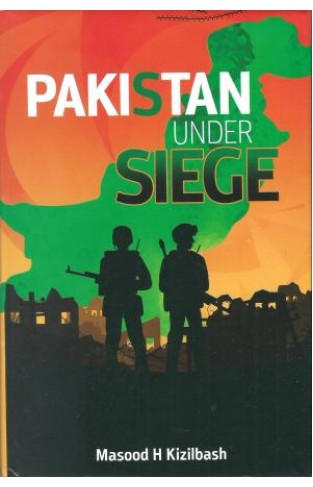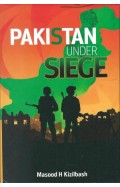Pakistan Under Siege
By: Masood h kizilbash
-
Rs 1,100.75
- Rs 1,295.00
- 15%
You save Rs 194.25.
Due to constant currency fluctuation, prices are subject to change with or without notice.
After seventy years of its tumultuous existence, Pakistan is a nuclear state, imploding with terrorism and extremism with centrifugal forces pulling it apart. What is its future? To find an answer, the Author delves into political and economic events of over 150 years time-frame between May, 1857 and present day. He draws some independent conclusion from the empirical research different from other authors. He links Pakistan’s present predicament to them. He argues that independence of India and its division into two states- India and Pakistan- on 14th/15th August, 1947 owed largely to rival interests of U.S.A and U.K following the Second World War and only little to indigenous struggle for independence. The Author further argues that despite forecasts of Pakistan’s early demise, it became a viable and functional state within few years of its existence on account of dedication, honesty and hard work of its early leadership of Jinnah and Liaquat. Thereafter, the country lost its moorings under subsequent leaders to embrace its present existential crisis. He is of the view that the course of the events in Pakistan was largely determined by the international power politics. With its weak status and absence of a strong leadership, international actors will continue to buffet Pakistan’s destiny and determine where it lands in future unless a strong leadership emerges to change its course.
| Book | |
| What's in the Box? | 1 x Pakistan Under Siege |
After seventy years of its tumultuous existence, Pakistan is a nuclear state, imploding with terrorism and extremism with centrifugal forces pulling it apart. What is its future? To find an answer, the Author delves into political and economic events of over 150 years time-frame between May, 1857 and present day. He draws some independent conclusion from the empirical research different from other authors. He links Pakistan’s present predicament to them. He argues that independence of India and its division into two states- India and Pakistan- on 14th/15th August, 1947 owed largely to rival interests of U.S.A and U.K following the Second World War and only little to indigenous struggle for independence. The Author further argues that despite forecasts of Pakistan’s early demise, it became a viable and functional state within few years of its existence on account of dedication, honesty and hard work of its early leadership of Jinnah and Liaquat. Thereafter, the country lost its moorings under subsequent leaders to embrace its present existential crisis. He is of the view that the course of the events in Pakistan was largely determined by the international power politics. With its weak status and absence of a strong leadership, international actors will continue to buffet Pakistan’s destiny and determine where it lands in future unless a strong leadership emerges to change its course.
Zubin Mehta: A Musical Journey (An Authorized Biography)
By: VOID - Bakhtiar K. Dadabhoy
Rs 892.50 Rs 1,050.00 Ex Tax :Rs 892.50
The Origins of Political Order From Prehuman Times to the French RevolutioN
By: Francis Fukuyama
Rs 4,045.50 Rs 4,495.00 Ex Tax :Rs 4,045.50
Manning Up: How the Rise of Women Has Turned Men into Boys
By: Kay Hymowitz
Rs 845.75 Rs 995.00 Ex Tax :Rs 845.75
The Obama Syndrome: Surrender At Home War Abroad
By: Tariq Ali
Rs 1,100.75 Rs 1,295.00 Ex Tax :Rs 1,100.75
The Quest For Meaning: Developing A Philosophy Of Pluralism
By: Tariq Ramadan
Rs 1,185.75 Rs 1,395.00 Ex Tax :Rs 1,185.75
The Pakistan US Conundrum Jihadists The Military And The People The Struggle For Control
By: Yunas Samad
Rs 1,185.75 Rs 1,395.00 Ex Tax :Rs 1,185.75
An Enemy We Created: The Myth Of The Taliban Al Qaeda Merger In Afghanistan 19702010
By: Alex Strick van Linschoten
Rs 4,197.50 Rs 8,395.00 Ex Tax :Rs 4,197.50
WikiLeaks: Inside Julian Assanges War on Secrecy
By: David Leigh & Luke Harding
Rs 637.50 Rs 850.00 Ex Tax :Rs 637.50
No similar books from this author available at the moment.
No recently viewed books available at the moment.
Zubin Mehta: A Musical Journey (An Authorized Biography)
By: VOID - Bakhtiar K. Dadabhoy
Rs 892.50 Rs 1,050.00 Ex Tax :Rs 892.50














-120x187.jpg?q6)





-120x187.jpg?q6)



-120x187.jpg?q6)



